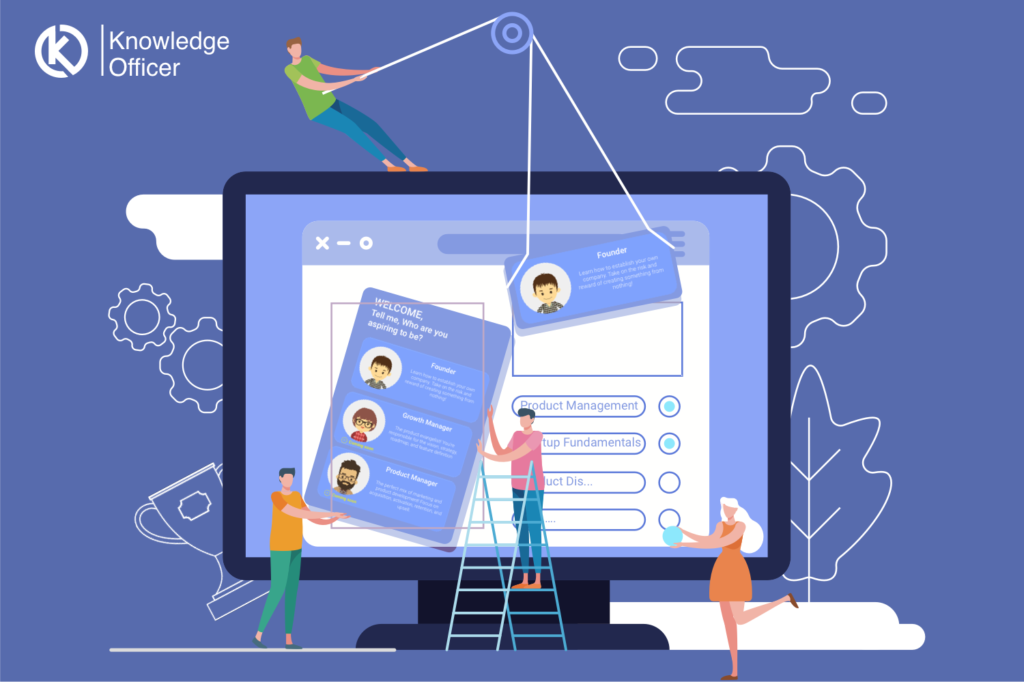
Are you thinking about building the next big thing in EdTech? Well, I have to say that the journey is really amusing but extremely challenging at the same time! Many have tried to revolutionize education and failed. That’s why you need to make sure you are up to the challenge and ready for a very long journey and not in it for a quick exit!
I want to share with you some of the lessons I learnt (and still learning) while building Knowledge Officer, a career-oriented learning platform for professionals who want to fulfil their dream career goals. I will share the lesson of each stage I have been through so far. We have witnessed 3 stages: pre-MVP, MVP and product.
Pre-MVP Stage:
This is the stage where you would do the market research and early customer development activities. You are still validating the problem and trying to understand the space more. Many founders, unfortunately, skip this stage altogether and go directly to the next one. They start building blindly without necessarily being equipped with the right knowledge and understanding of the space they want to operate in.
Challenges facing EdTech founders:
- Small Network: A small number of hugely successful EdTech startups (compared to other markets like FinTech, AdTech, etc) so a very small network to learn from and everyone is still exploring and finding his own way.
- Access to data: It’s very hard and challenging to put your hands on real, authentic and comprehensive data around the market size and different financial activities.
- Getting research evidence: This challenge continues in the upcoming stages but you should start thinking about it from the beginning. Education startups need science and research based evidence on their approach to learning and education. I would definitely recommend UCL educate program for that side.
MVP Stage:
This is the stage that comes after going live with an MVP and validating it with users. Usually, this is the stage where you start reaching out to investors as well. This is where you see real and live insights from your potential users and customers and get more confidence on the problem and your solution.
Challenges:
- EdTech requires rapid prototyping and pivots: I have been playing and testing EdTech products and platforms for more than 7 years now and I can’t remember one product that reached a massive success without at least one pivot. And because usually at this stage your runway is so short, it becomes really challenging to try different approaches and test many grounds unless you forced yourself to be super lean.
- Investment: It’s extremely challenging to raise for an EdTech startup and you will find very few VCs who focus on only EdTech investment. The reason behind that is that usually it takes years for an EdTech startup to start making decent revenues, let alone profits. Not all investors are patient to invest in a product and vision rather than investing in a business that would yield an immediate or near future return. There is also a challenge with all EdTech founders on how they materialise the impact of learning and education on their users and measure the value of what their product provides especially at that stage.
Product Stage:
Now, you have secured some investment or decided to bootstrap and have a live product with many users/customers. You now transition from your mere focus on building a product to thinking more about building a viable business that sustains this product.
Challenges:
- It’s not really that hard to acquire users for your product at this stage given your value proposition is clear and the product is somehow useful. The real challenge is with retention and engagement and keeping these 2 metrics at a healthy level while you are growing your user base.
- Monetization: As I mentioned earlier, it’s always challenging to monetize in EdTech and even the behemoth of this market are still experimenting and trying to figure it out like Duolingo for example. Historically, this is where EdTech entrepreneurs have failed.
- Learning is a very complex process and involves deep understanding of how the brain works and how people learn effectively. There is a mix of science, engineering and philosophy behind that which needs careful study and growth-minded teams.
- Schools/institutes/companies usually have approval process that could be very long depending on your product and the compliance needs especially given the difficulty to materialise the value your product offers sometimes because of point (3)
While reflecting on those challenges, I wanted also to summarise some of the most famous non-successful stories in EdTech and a short lesson to learn from each one.
| Startup | Failure Reason |
| SharpScholar | Layers of approvals needed for the product to be used. The usage of the product depended on approval from students and admin which complicated the relationship with teachers and made the process much longer and cumbersome. |
| Readmill | Long story short, they failed to monetize to sustain the business. |
| Shelfie | Similar to Readmill and many businesses in the ebook industry, they failed to create a sustainable business model. According to the founder, “In the end the unit economics of ebook sales just don’t make much sense if you don’t own the platform like Apple, Google, or Amazon.” |
| KNO | There were doing well and raised from top VCs and investors till Apple came with its iPad and ate their lunch! They failed to cope with the disruption in the market. |
Hope we all learn from those lessons and create EdTech products that truly serve learners, continuously innovate and create viable and innovative business models to sustain the growth of our companies. Fixing education and helping people to learn is a noble cause and we believe that learning is one of the main pillars of having a successful life. That’s what drives us to work every day till we get to fix the Skills Gap!